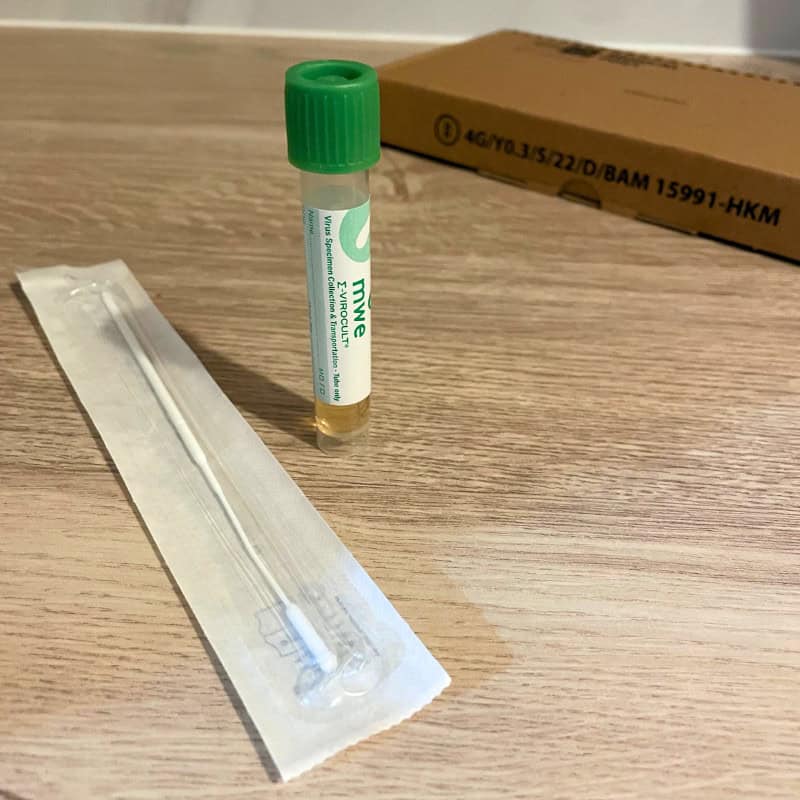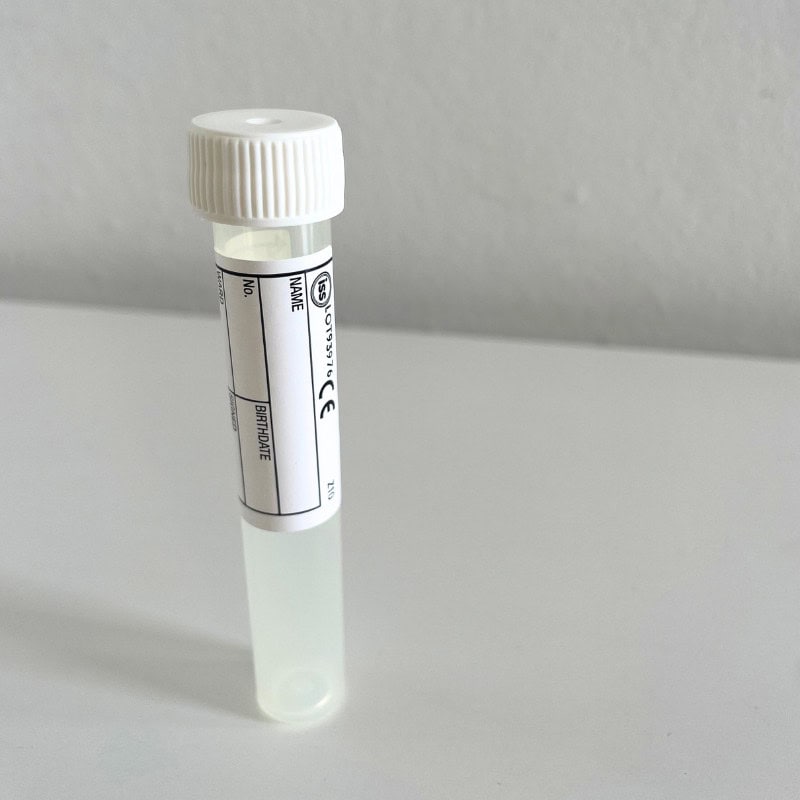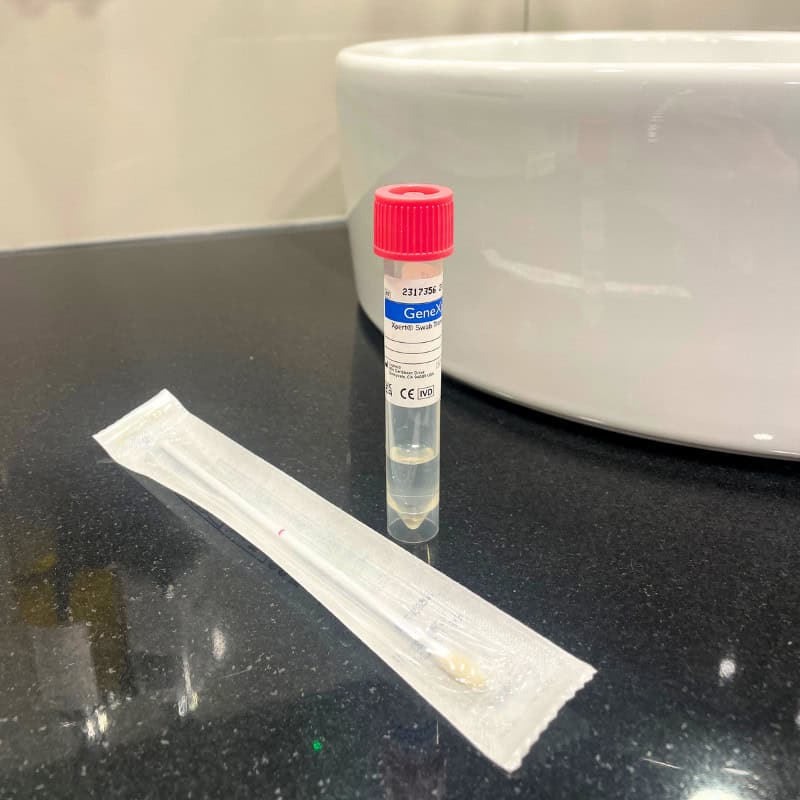Month: February 2023
Cholesterol is a type of fat that is found in the blood and plays an important role in our bodies. However, high levels of cholesterol can lead to serious health issues, such as heart disease, stroke, and other cardiovascular problems. Unfortunately, cholesterol is often referred to as a “silent killer” as there are usually no symptoms and the first indication that something is wrong may be a heart attack. That’s why it’s important to have your cholesterol levels checked regularly.
Instant cholesterol testing only requires a short nurse appointment that provides you with both the test and the results during the same appointment. This type of testing makes it easy and convenient for people to understand their cholesterol levels and take steps to keep them under control.
Statistics from the National Institute for Health and Care Excellence (NICE) show that cardiovascular disease (CVD) is the leading cause of death in the United Kingdom, accounting for around 26% of all deaths. The most common type of CVD is coronary heart disease, which is caused by a build-up of fatty deposits in the arteries leading to the heart. High cholesterol levels can contribute to the formation of these fatty deposits.
By knowing your cholesterol numbers through instant testing, you can understand your risk of developing CVD and take the necessary steps to keep your levels under control. NICE recommends that all adults in the UK should have their cholesterol levels checked at least once every five years, or more frequently if they are at increased risk of CVD. Those at increased risk include people with a family history of CVD, smokers, people with high blood pressure, and people with diabetes.
To keep your cholesterol levels under control, it is important to make changes to your diet. This includes eating more fruits, vegetables, whole grains, and lean proteins, and reducing your intake of saturated and trans fats. You should also aim to maintain a healthy weight and be physically active for at least 30 minutes a day.
If lifestyle changes are not enough, medication may be required. The most common type of cholesterol-lowering medication is statins, which work by reducing the production of cholesterol in the liver. Statins are widely used in the UK and are safe and effective.
The National Institute for Health and Care Excellence (NICE) has recently released updated guidelines on the use of statins, which now recommend that they can be considered for people at a lower risk threshold.
Further reading on “NICE recommends wider use of statins for prevention of cardiovascular disease (CVD)”.
In conclusion, instant cholesterol testing provides an easy and convenient way to understand your cholesterol levels and take steps to keep them under control. Regular testing is important for everyone in the UK, especially those who are at increased risk of CVD. By knowing your numbers, making changes to your diet, maintaining a healthy weight, and being physically active, you can help keep your cholesterol levels in the healthy range and reduce your risk of developing serious health problems.
Related services available at Fleet Street Clinic:
Instant Cholesterol Testing with a nurse
Blood Tests at Fleet St. Clinic
Well Person Medical
GP Services
As a private healthcare clinic, our goal is to provide the best protection against pneumonia for our patients. One of the key tools in this fight is the pneumococcal vaccine. One of the latest advancements in this area is the Apexxnar vaccine. This 20-valent vaccine provides protection against 20 different serotypes of the pneumococcal bacteria, offering a more comprehensive defence against pneumonia.
We understand that choosing the right vaccine can be complex and that different patients may require different solutions. That’s why we recommend speaking with one of our healthcare providers to determine which vaccine, including Apexxnar, is best for you. They will consider risk factors such as your age, underlying health conditions, and previous vaccinations, to ensure you receive the most effective protection against pneumonia.
At Fleet St. Clinic, we believe in the power of prevention, and that the right vaccine can make all the difference. So, if you’re looking for the best defence against pneumonia, consider talking to us about the Apexxnar vaccine today.
Information about Pneumonia:
Pneumonia is a lung infection that can cause a range of symptoms, including:
- Cough: A persistent cough that produces mucus or phlegm is a common symptom of pneumonia. The cough may be dry or productive, and the mucus or phlegm may be green, yellow, or rust-coloured.
- Fever: Pneumonia often causes a high fever, which may be accompanied by chills and sweats.
- Shortness of breath: Pneumonia can cause difficulty breathing, especially during physical activity. The shortness of breath may be accompanied by chest pain or tightness.
- Fatigue: Pneumonia can cause extreme tiredness and weakness, making it difficult to carry out normal daily activities.
- Muscle aches: Pneumonia can cause muscle aches and joint pain, which may be mistaken for the flu.
- Chest pain: Pneumonia can cause chest pain, especially when breathing deeply or coughing.
- Nausea and vomiting: Some people with pneumonia may experience nausea and vomiting, especially if the infection is caused by a type of bacteria known as Legionella.
- Confusion or disorientation: Pneumonia can cause confusion or disorientation, especially in older adults and people with underlying health conditions.
It’s important to seek medical attention if you experience any of these symptoms, as pneumonia can be a serious and potentially life-threatening condition.
More information on pneumonia.
Who is considered “high-risk”?
Individuals considered to be at high risk for hospitalisation due to pneumonia include the elderly, young children, people with weakened immune systems (including people who have had their spleen removed), and individuals with underlying health conditions such as chronic heart or lung diseases, diabetes, and liver or kidney problems.
At the Fleet St. Clinic, we also regard anyone who has had a previous significant episode of pneumonia as likely to benefit from being vaccinated.
When is the best time for a pneumonia vaccine?
The best time to vaccinate against pneumonia depends on various factors such as the type of vaccine, the individual’s age, and underlying health conditions.
The pneumonia vaccine is not the same as the flu vaccine, as it doesn’t need to be given at a certain time of year.
For the pneumococcal vaccine, it is generally recommended to receive the vaccine once in a lifetime for most adults. Some individuals may need a booster shot, and this is determined by a healthcare provider such as a doctor or nurse.
How to book an appointment?
Booking an appointment is easy. If you are on the go, you can book online through our online booking system, pre-payment is required.
If you would like to discuss anything further or would like to book with our reception team, you can call them on +44 207 353 5678 or email us at info@fleetstreetclinic.com
Related services available at Fleet Street Clinic:
Ovarian cancer is a disease that affects thousands of women worldwide each year and is often referred to as the silent killer due to its silent symptoms, including bloating, abdominal pain, and changes in bowel habits, which are often mistaken for other conditions. Despite advances in treatment, the disease remains a major public health concern due to its high mortality rate. However, new data from a study funded by Cancer Research UK (CRUK) suggests that a seemingly unlikely tool – supermarket loyalty card surveillance – could help spot ovarian cancer early, when it is most treatable.
The study, which was published in JMIR Public Health and Surveillance, analysed data from supermarket loyalty card programs and found that changes in purchasing behaviour could be used to detect early signs of ovarian cancer.
Researchers found that women with ovarian cancer often experience a decline in their appetite and energy levels, which can result in changes in their grocery shopping habits. By monitoring these changes in real-time, it may be possible to detect the disease early and improve the chances of successful treatment.
This is an exciting development in the fight against ovarian cancer, and one that has the potential to revolutionise the way we detect and treat the disease. By leveraging the vast amounts of data generated by supermarket card programs, healthcare providers and public health officials could identify women who may be at risk of ovarian cancer and encourage them to seek early medical attention. This could help to improve the outcomes of treatment and reduce the overall impact of the disease on society.
One of the key benefits of supermarket card surveillance is that it allows for continuous monitoring of women’s purchasing behaviour. This means that healthcare providers can receive real-time alerts when changes occur, allowing them to act quickly and effectively. This level of monitoring is not possible with traditional screening methods, which are typically performed only once or twice per year and may miss early signs of the disease.
Additionally, supermarket card surveillance is a cost-effective way to monitor the population for signs of ovarian cancer. Unlike other screening methods, it does not require specialised equipment or trained personnel, and the cost of monitoring is negligible compared to the cost of treatment. This could make it possible to implement large-scale screening programs, even in resource-limited settings, and reach a greater number of women who may be at risk of ovarian cancer.
Of course, it’s important to keep in mind that supermarket card surveillance is not a substitute for traditional screening methods, such as ultrasound or CA-125 tests, or for regular self-reporting and awareness of symptoms. However, it could be used as an adjunct to these methods, helping to improve the accuracy of screening and reduce the number of missed cases.
Another important consideration is the privacy of women whose purchasing behaviour is being monitored. While supermarket card surveillance has the potential to help detect ovarian cancer early, it is important to ensure that women’s privacy is protected and that the data collected is used only for medical purposes. Healthcare providers and public health officials should work together to ensure that any monitoring programs are transparent, secure, and in compliance with privacy regulations.
In conclusion, the findings of this study are a major step forward in the fight against ovarian cancer. By leveraging supermarket card surveillance, it may be possible to detect the disease early, when it is most treatable, and improve the outcomes of treatment for women around the world. However, it is important to carefully consider the privacy implications of monitoring purchasing behaviour and to ensure that any programs implemented are transparent, secure, and in compliance with privacy regulations. The early detection of ovarian cancer is a critical goal, and we hope that this research will help to pave the way for new and innovative approaches to screening and treatment. Additionally, women should be encouraged to seek medical attention if they notice any changes.
Reference Source: https://publichealth.jmir.org/2023/1/e41762
Related services available at Fleet Street Clinic:
Is there such a thing as testing too early for STIs?
Yes, in fact, if you test too soon after exposure to an STI aka during the “window period”, you may not get an accurate result.
The ‘window period’ is the length of time it can take between catching an infection and when it will show in a test. It’s important to note that if you are tested earlier than the “window period”, some tests may not detect the STI, even though an individual is infected.
The timing of STI testing after potential exposure varies depending on the specific infection. In general, it is best to wait until a sufficient amount of time has passed for the infection to be detectable, but not so long that the infection has already caused damage.
The “window period” for common STIs:
Chlamydia and Gonorrhoea
– These bacterial infections can be detected 2 weeks after exposure. Symptoms can appear before this so those with symptoms shouldn’t delay testing.
HIV
– Antibody tests can be taken 4 weeks after exposure, whilst instant antibody tests are suitable for use 90 days post contact. Early detection RNA tests can be taken from 10 days after potential exposure. Your healthcare provider will be able to advise which test is most suitable for you.
Syphilis
– Antibody tests for syphilis can be detected 12-weeks after a suspected exposure. Symptoms can appear before this so those with symptoms shouldn’t delay testing, as alternative tests can be taken to diagnose.
If you have been exposed to an STI and are concerned about potential infection, it is recommended to have a sexual health consultation at the earliest opportunity. Your healthcare professional will be able to discuss your risk factors, and then advise the appropriate time interval for tests based on the type of test being used. Your healthcare provider can help you determine which test is right for you, and when to get tested. They will discuss this with you during your sexual health consultation.
It is important to note that some STIs, such as herpes and human papillomavirus (HPV), can have no symptoms, so it is possible to have an infection and not know it. Regular STI testing is the only way to diagnose and treat an infection early, which can prevent complications and reduce the risk of transmission to others.
If you have been sexually active and have concerns about potential STI exposure, it is best to consult with a healthcare provider. They can help you determine the best course of action, including when to get tested and which tests to have.
What STIs can we test for?
Fleet St. Clinic offers testing and treatment for several different STIs including:
– HIV
– Gonorrhoea
– Syphilis
– Chlamydia
– Herpes
– HPV – Genital Warts
Additional tests for symptomatic patients include:
– Mycoplasma
– Ureaplasma
– Trichomoniasis
Results
Rapid results are available for most of our STI checks meaning we can provide you with answers on the same day as your tests. Most swabs are analysed within our onsite laboratory so we can provide you with answers as soon as possible.
Remove unnecessary worry by selecting our fastest turnaround times. These vary for each type of STI, so discuss this with your nurse or doctor during your sexual health consultation.
How regularly should I be getting tested?
Getting tested for sexually transmitted infections (STIs) is an important part of maintaining sexual health. There is no one-size-fits-all answer to when to get tested, as the frequency and timing of STI testing depend on several factors, including:
1. Sexual behaviour: Individuals who engage in higher-risk sexual behaviours, such as unprotected sex, multiple sexual partners, or sexual contact with someone who has an STI, should get tested more frequently.
2. Personal health history: Individuals who have a history of STIs or other health conditions that affect sexual health should get tested more frequently.
3. Age: Young people and older adults may be at higher risk for STIs and should consider getting tested more often.
4. Pregnancy: Pregnant women should be tested for STIs during their first prenatal visit, as well as any other time during their pregnancy as recommended by their healthcare provider.
It is also important to note that some STIs can have no symptoms, so it is possible to have an infection and not know it. Regular STI testing is the only way to diagnose and treat an infection early, which can prevent complications and reduce the risk of transmission to others.
Related services available at Fleet Street Clinic:
HIV (Human Immunodeficiency Virus) is a viral infection that damages cells in your immune system. As a result, it weakens the body’s ability to fight off everyday infections such as the common cold. If you have HIV and get sick with a cold, you are much more likely to experience complications, such as developing pneumonia.
HIV is found in the body fluids of an infected person, such as semen, vaginal and anal fluids, blood and breast milk. It is not found in sweat, urine or saliva. Meaning HIV is typically spread by unprotected sex, the sharing of injecting equipment such as needles, and/ or passed from mother to baby either through birth or breastfeeding.
About National HIV Testing Week
National HIV Testing Week #HIVTestWeek aims to raise awareness of HIV and AIDS. It is an annual national campaign to encourage people to get tested for HIV regularly to reduce the number of people who are diagnosed late or remain undiagnosed.
Out of the 106,890 people in the UK with HIV, 1 in 20 of those do not realise they are HIV positive. Which is why it is so important to make sure everyone gets tested to know their status.
Data from 2019, revealed that 42% of people were diagnosed late. A late diagnosis significantly increases the risk of the virus seriously damaging your health, not to mention the fact that you are more likely to pass the virus on during the period when you are unaware of a positive diagnosis. The only means to address this issue is to increase awareness of the importance of HIV testing.
If you have HIV for a long time without knowing, it can damage your health and shorten your life expectancy. It’s a good idea to test at least once a year (or more if you have unprotected sex with more than one partner). Early detection can give you a better quality of life and reduce the spread of the disease.
While there is no ‘cure’ for HIV, thankfully there are now very effective treatments available that allow those who are HIV positive to live a healthy life and have a normal life expectancy. There is also emergency treatment available if you have been exposed to HIV within the last 72 hours (PEP). Additionally, there is medication available to prevent contracting HIV (PrEP) and even a tablet that will prevent you passing the virus on to anyone else. Access to these treatments is available to anyone HIV positive but the only way to know your HIV status is to get tested.
Know Your Status
At Fleet Street Clinic, we have two types of HIV tests available: an instant test and a blood test. An instant HIV test can provide you with results within a 15 minute nurse appointment. The test is a simple blood test done via a needle prick to the finger and is suitable for use 90 days post-exposure. It is a very simple process with extremely accurate results.

For HIV testing week we’re promoting our ‘So quick you can do whilst grabbing a coffee’ campaign to highlight just how quick an HIV test can be. We want to encourage all to make time to find out their HIV status.
Get Tested
We offer a number of HIV Tests, some of which can be performed in the clinic in just 15 minutes. You can be tested for HIV from as early as 28 days post-contact with a blood test, but don’t worry, during your appointment the clinician will let you know which test they recommend based on your history. Following an HIV test, we are on hand to offer guidance and referrals, should they be required.
Your privacy will be strictly protected.
You can book an HIV Test Online.
For more information on HIV you can visit our HIV page or HIV Prevention England.








